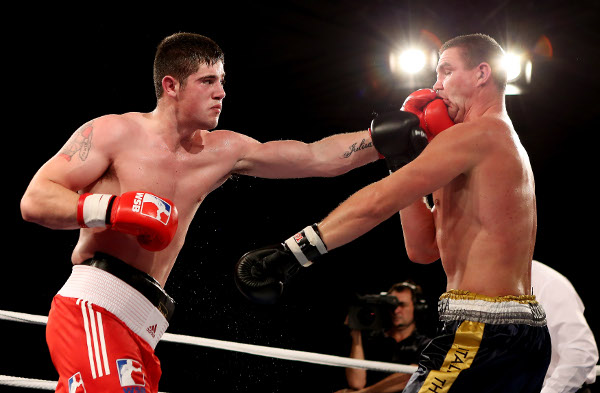World Series of Boxing (WSB) preview:
British Lionhearts featuring Joe Ward v German Eagles
Earls Court, Friday, December 14th.
THERE’S a moment in From Lords to the Ring – the Sky documentary series that followed Andrew Flintoff’s journey from cricketer to boxer – when Barry McGuigan appears at a training session with Mike Tyson.
It is a fun afternoon for Iron Mike. He bowls over to the star-struck cricketer to jokingly tell the big man he has nothing to worry about: “You got the McGuigan’s looking after you man,” he laughs.
It’s a moment of fun at a nervous time for not only the boxer, but the fight game’s bigger picture; a game that still consumes the life of Barry McGuigan.
He says the business is changing.
Pre and post Olympics, the amateur arm of the sport has grown ultra-serious, to the point that Flintoff’s sojourn in the pro-ranks contrasts sharply with the semi-professional event which gloves off in London’s Earl’s Court on Friday.
Top of the bill is Irish light-heavyweight Joe Ward, current European champion in the amateur ranks, and regarded among the best in the world.
The World Series of Boxing (WSB) isn’t new. But the concept is still taking nervous first steps into a tough marketplace. The series has gravitas however because it’s built on a simple equation: only the best amateur boxers get picked to compete and they meet each other, regularly.
With many of the world’s top amateurs choosing to retain their status, keeping one eye on the Rio in 2016, this makes the competition top-end.
“High-quality competitive boxing is what people want to see,” says McGuigan. “They don’t want to see matches that are predictable. In professional boxing, boys are fed bums for the first half-dozen fights. They may get a test every now and again. But most of the time you almost know before you sit down that your man is going to win. This is where WSB is different because these are competitive 50:50 matches. It is world class amateurs boxing without a vest or a head-guard.”

The former World Featherweight Champion is a fan/promoter and ambassador for the series. Today is a rare day off away from “a hotchpotch” of media commitments.
He is catching up on paperwork, talking about the WSB’s two brightest talents – Joe Ward and Olympic Silver medallist John Joe Nevin… he’s talking about the changes in the business.
“Boxers are not necessarily turning pro like they used to,” he says. “Not one of the Team GB or Irish medal winners from the Olympics has turned pro yet. John Joe Nevin was talking about signing professional papers with Amir Khan but he has decided to stay in amateur set up. Boxers are being offered more backing from Amateur International Boxing Association (AIBA) to stay in the amateur game. They don’t want to lose all their talent to the professional game.”
McGuigan says a lot of the amateurs are staying too. You only have to go back four years post Bejing Olympics when the opposite was true. The success of those Games decimated the British amateur team, with James Degale, Tony Jeffries, Frankie Gavin and Billy Joe Saunders all choosing to cash in their chips and turn professional.
While in Ireland the late Darren Sutherland left the High Performance Unit to take up a contract with Frank Maloney.
Compare that with now and the entire Team GB boxing medal winners have decided against the pro-ranks in favour of staying amateur or joining the WSB.
Once, gold medals won by flyweight Luke Campbell (GB) and super-heavyweight Anthony Joshua (GB), and silvers won by John Joe Nevin and Fred Evans (GB) would have been viewed as the ticket to bigger and brighter things. Not so now it seems.
“There is no such thing as amateur sport anymore,” says McGuigan. “The word amateur should be taken out of sport because most athletes are being funded to train full-time and the reality is if they want to compete and win international prizes, they can’t do it by being part-timers.
“The lure of Olympic gold is a huge huge thing for boxers and these new platforms allow a way back in.”
McGuigan says the sport is not in danger of being diluted by concepts like the WSB or another ‘professional’ platform set to be rolled out by the amateur world body in 2014. Why? Because these competitions feature, and will feature the world’s best fighters.
“Most of the boxers are high-performance athletes and are on £30,000 a year roughly. These are full time, fully paid athletes. The WSB gives them the chance to earn more money and fight some of the best fighters in the world, travel all over the world, and box as a team. Ward and Nevin (both signed with the British Lionhearts) are staying in the Irish set-up so this means they are still training with Billy Walsh, then they fly over and box.
McGuigan describes the arrangement as ideal: “They can try boxing over five rounds, without the head guard or the vest and sample what professional boxing is like, earn more money and still stay in their National set-ups. It’s a win/win situation for the boxers.”
For McGuigan these changes represent progress, the type of progress yet to yield such opportunities when he moved into the pro-game in the early 80s.
“It would have been very attractive to me because I got three ropey decisions at the end of my career and I knew that the amateur game didn’t suit me and that professional boxing was more my game.
“But you must remember that in my first 10 fights I earned £5000 - that’s £500 a fight. People wouldn’t believe that now. Its 30 years ago, but I didn’t start making any money until I started making a name.
“What you have now with the WSB format is a Champions League format – and it’s great place for young boxers to make their name.”

